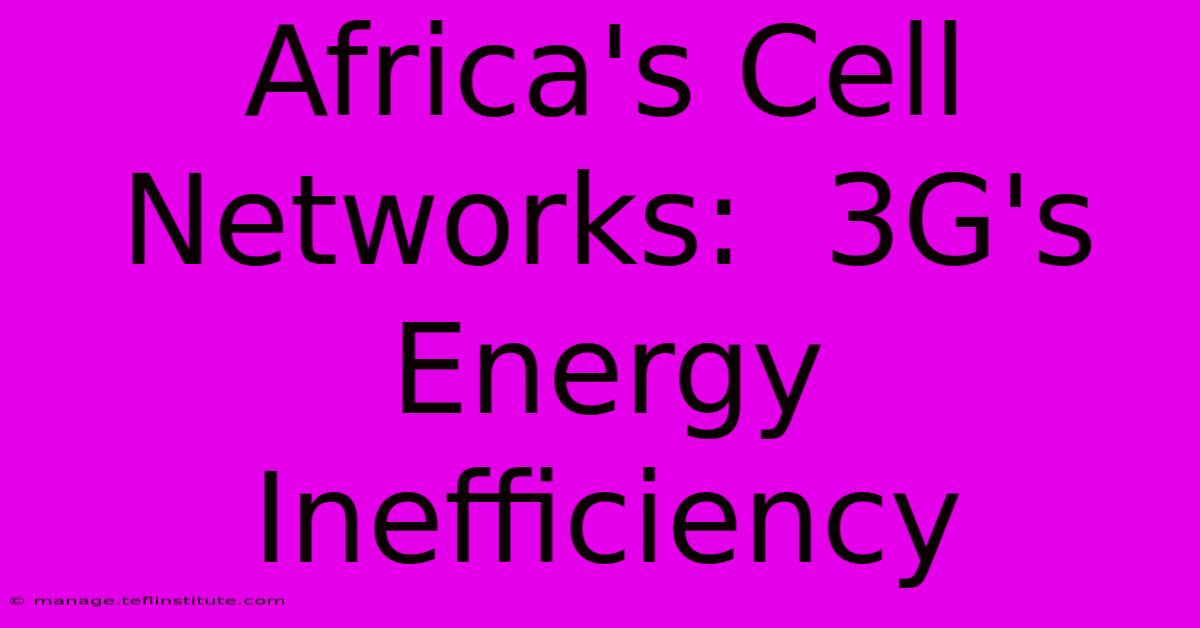Africa's Cell Networks: 3G's Energy Inefficiency

Table of Contents
Africa's Cell Networks: 3G's Energy Inefficiency and the Push for a Greener Future
Africa is experiencing a mobile boom. With a rapidly growing population and a surge in smartphone adoption, mobile networks are becoming the backbone of communication and economic development. But this connectivity comes at a cost – energy. 3G networks, the dominant technology across much of Africa, are notoriously energy-intensive, posing a significant challenge for a continent already grappling with energy scarcity.
The Energy Drain of 3G:
3G networks, while providing a substantial leap forward from previous generations, rely on older technology that consumes more power than newer standards. Their inefficient signal transmission, particularly in areas with weak coverage, results in higher energy consumption to maintain reliable connections. This translates to a significant drain on energy resources, especially in countries heavily reliant on fossil fuels.
The Impact on a Vulnerable Continent:
Africa's energy landscape is marked by challenges: limited access to electricity, reliance on expensive and polluting fossil fuels, and a growing demand for power to fuel economic growth. This energy inefficiency of 3G networks adds another layer of complexity to the already pressing issue of sustainable energy development.
The Case for a Greener Future:
The solution lies in embracing more energy-efficient technologies like 4G and 5G. These newer standards offer significant improvements in power consumption:
- Increased Efficiency: 4G and 5G networks are designed to be more efficient in transmitting data, requiring less power to maintain stable connections.
- Enhanced Bandwidth: These technologies allow for a higher volume of data to be transmitted using the same amount of energy, ultimately lowering the overall energy footprint.
- Advanced Network Optimization: Network operators are constantly optimizing their networks, using AI and machine learning to predict traffic patterns and adjust power consumption accordingly.
The Road to a Sustainable Mobile Future:
However, transitioning to newer technologies in Africa faces its own set of challenges:
- Infrastructure Costs: The investment required for upgrading infrastructure can be significant, particularly for developing countries with limited resources.
- Access to Technology: Ensuring widespread availability of 4G and 5G equipment and the necessary expertise to manage these technologies can be a barrier in some areas.
- Regulatory Frameworks: Governments need to create enabling environments that encourage investment in greener technologies and ensure the efficient allocation of spectrum for 4G and 5G networks.
Moving Forward:
Overcoming these challenges requires a collaborative approach. Governments, telecommunications companies, international organizations, and private investors must work together to:
- Prioritize investment in renewable energy sources: This will not only reduce reliance on fossil fuels but also provide a sustainable foundation for mobile network operations.
- Promote innovative solutions: Companies are developing energy-efficient base stations, solar-powered network solutions, and other technologies that can significantly reduce the energy footprint of mobile networks.
- Foster digital skills development: Investing in training programs for local engineers and technicians will be crucial for managing and maintaining these new technologies.
Africa's mobile future is bright, but it needs to be built on a foundation of sustainability. Embracing greener technologies, investing in infrastructure, and fostering collaboration are essential steps towards creating a more efficient and sustainable mobile landscape for the continent. The future of mobile in Africa is not just about faster connections, but about a future where technology empowers a greener and more equitable society.

Thank you for visiting our website wich cover about Africa's Cell Networks: 3G's Energy Inefficiency . We hope the information provided has been useful to you. Feel free to contact us if you have any questions or need further assistance. See you next time and dont miss to bookmark.
Featured Posts
-
First T20 Australia Vs Pakistan Live
Nov 14, 2024
-
John Lewis Ad Christmas Memories Sisterly Bond
Nov 14, 2024
-
This Morning Dermots John Lewis Advert Take
Nov 14, 2024
-
John Lewis Christmas Ad A Mixed Reaction
Nov 14, 2024
Latest Posts
-
Charles Champions Food Charity
Nov 15, 2024
-
Pedro Pascal Brings Sister To Gladiator Ii
Nov 15, 2024
-
Pedro And Lux Pascal Shine At Gladiator Ii Event
Nov 15, 2024
-
King Charles Fights Food Poverty
Nov 15, 2024
-
Lux Pascal Attends Gladiator Ii Premiere With Brother
Nov 15, 2024
-
The Real Pedro Pascal Meet His Sister
Nov 15, 2024
